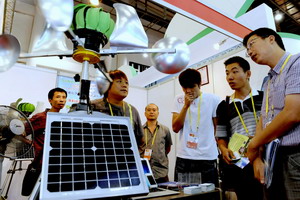Stocks continue to slide
Updated: 2011-09-09 07:48
By Irene Shen (China Daily)
|
|||||||||||
SHANGHAI - Stocks on the Chinese mainland fell for the fifth time in six days on Sept 8.
The decline was sparked by concerns that the central bank may raise interest rates to stem inflation, damping the outlook for economic growth.
"There are no signs of loosening monetary policy," said Wu Kan, a fund manager at Dazhong Insurance Co, which oversees $285 million. "Inflation may rebound after easing in August, given the rising prices for pork and other goods."
The benchmark Shanghai Composite Index slipped 0.7 percent to 2498.94. The CSI 300 Index slid 0.8 percent to 2756.10 and the ChiNext index, tracking startup companies, lost 0.9 percent to 891.93.
The Shanghai gauge has slumped 11 percent this year as the central bank raised interest rates five times and ordered lenders to set aside more cash as deposit reserves 12 times since the start of 2010 to contain inflation. It is valued at 11.6 times estimated earnings, matching a record low set on Tuesday, according to daily data compiled by Bloomberg.
Rate increases would be triggered by quickening inflation, the Securities Times reported on Thursday, citing an unidentified economist at China International Capital Corp, Asia's biggest investment bank.
A gauge tracking financial companies slipped 0.8 percent. Bank of Communications Ltd, the mainland's fifth-largest lender, retreated 0.9 percent to 4.66 yuan (73 US cents). Bank of Beijing Co lost 1.2 percent to 9.63 yuan.
China's inflation jumped to a three-year high of 6.5 percent in July. The government's full-year target for inflation is 4 percent.
Pork prices are set to stay high until after the lunar new year holiday, said Qiao Yufeng, vice-president of the China Animal Husbandry Association, in Shanghai on Thursday. The holiday falls in January next year.
Prices of pork, the most consumed meat in the world's most populous nation, rose 57 percent in July. China may be unable to curb record pork prices because of insufficient stockpiles and small farm herds, according to Beijing Orient Agribusiness Consultant Ltd.
Mainland stocks face challenges this year because the government is unlikely to ease measures to stem inflation even as global economic growth slows, said Christie Ju, the head of China research at Jefferies Group Inc.
Investors should be cautious on the nation's property developers as sales may worsen in the next two months, while small-company shares are more vulnerable to a global downturn, said Ju, who joined the US investment bank in Hong Kong in January.
UBS AG, Morgan Stanley and Deutsche Bank AG have lowered their economic growth forecasts for China for next year, saying the slowdown in developed countries will hurt demand for exports. The economy grew 9.5 percent in the second quarter, slowing from a 9.7 percent expansion the previous quarter.
Bloomberg News
Related Stories
China's stocks down 0.68% -- Sept 8 2011-09-08 16:55
China's stocks up 1.84% -- Sept 7 2011-09-07 16:37
Challenges insufficient to shift China's monetary policy 2011-08-31 10:06
China should stick to prudent monetary policy 2011-08-24 14:22
- Time to focus on quality in finance, researcher says
- China's success can make US more prosperous
- ICBC signs MOU with UAE's industrial zone
- China's Lashou planning US IPO
- China's inflation eases to 6.2% in Aug
- Nike admits to false advertising
- Yuan will be fully convertible by 2015
- Shanghai to build world's biggest expo center













